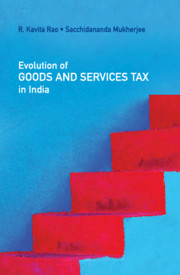Book contents
- Frontmatter
- Contents
- List of Figures
- List of Tables
- Acknowledgements
- List of Abbreviations
- Introduction
- Part I Genesis and Evolution of GST in India
- 1 Decades of Indirect Tax Reforms in India: A Journey towards Goods and Services Tax (GST)
- 2 Towards GST: Choices and Trade-offs
- 3 Goods and Services Tax: The Thirteenth Finance Commission and the Way Forward
- 4 Present State of Goods and Services Tax (GST) Reform in India
- Part II Revenue Neutrality of GST
- Part III GST Administration and Possible Impacts of GST on Indian Economy
- Conclusion: Impact of GST and What Might Happen
- Index
3 - Goods and Services Tax: The Thirteenth Finance Commission and the Way Forward
from Part I - Genesis and Evolution of GST in India
Published online by Cambridge University Press: 26 April 2019
- Frontmatter
- Contents
- List of Figures
- List of Tables
- Acknowledgements
- List of Abbreviations
- Introduction
- Part I Genesis and Evolution of GST in India
- 1 Decades of Indirect Tax Reforms in India: A Journey towards Goods and Services Tax (GST)
- 2 Towards GST: Choices and Trade-offs
- 3 Goods and Services Tax: The Thirteenth Finance Commission and the Way Forward
- 4 Present State of Goods and Services Tax (GST) Reform in India
- Part II Revenue Neutrality of GST
- Part III GST Administration and Possible Impacts of GST on Indian Economy
- Conclusion: Impact of GST and What Might Happen
- Index
Summary
Introduction
The introduction of the goods and services tax (GST) is expected to be a major reform in the arena of domestic indirect taxes in India. While this new regime will change the tax base of both central and state taxes, the extent of its impact on the economy as well as the finances of various levels of government was not clear. The Thirteenth Finance Commission (THFC) was assigned the task of incorporating the impact of the proposed implementation of the GST into its overall recommendations. To obtain an assessment of the GST's likely impact, the THFC constituted a task force. The task force submitted its report (Finance Commission 2009a) to the THFC on 15 December 2009 and its recommendations were endorsed in the final Report of the THFC (2010–2015) (Finance Commission 2009b, subsequently Report).
The recommendations of the THFC, which says that ‘both the Centre and the States should conclude a Grand Bargain to implement the model GST’, comprise five elements.
There will be a prescribed design for the GST as a consumption-based tax subsuming the bulk of all indirect taxes, including stamp duty and state excises. It will be a single rate regime with a few exemptions, have a uniform threshold for the centre and all states, uniform rates of tax across all states, and include a proposed design for treatment of interstate transactions.
There will be an emphasis on harmonised tax laws and procedures for administration, and common dispute resolution and advance ruling mechanisms, as well as simultaneous implementation by all the states.
There will be a binding agreement between the centre and the states on the design as well as the rates of tax to be adopted, and the conditions under which the rates can be altered. The THFC's proposed scheme says that for decreasing the rates, all states will have to agree, but for increasing them, only two-thirds need agree. The power of veto will be vested in the centre.
In the event of the agreement being violated, disincentives in the form of withholding state-specific grants and GST compensation grants will apply.
There will be a phased implementation allowing for delayed incorporation of real estate transactions into the base and allowing for a two-rate tax in place of one in the initial years of implementation, with an agreement to move forward before 31 December 2014.
- Type
- Chapter
- Information
- Evolution of Goods and Services Tax in India , pp. 45 - 59Publisher: Cambridge University PressPrint publication year: 2019
- 3
- Cited by



